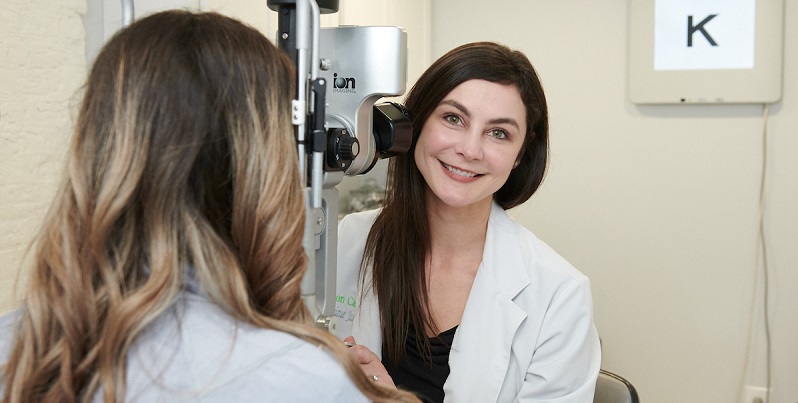
Our New Orleans optometrist will provide a comprehensive exam to evaluate the health of your eyes, detect any signs of disease, and answer all of your questions about protecting your vision long-term.
Annual exams for New Orleans patients with diabetes can help detect and prevent serious eye conditions.
Our optometrist Dr. Monique Jackson, who earned her Doctor of Optometry in 2015 from the University of Houston, has mastered several optometry specialties, including pediatrics, ocular disease, contact lens fitting, and dry eye services. Dr. Jackson has extensive knowledge of diagnoses and treatments of all disorders that affect the eye or vision, including diabetes.
Here, she answers questions about what to expect during diabetic eye exams, why they’re important, and what could be done to help with the early detection and prevention of diabetes-related eye diseases.
Why are we talking about diabetic eye exams?
But first, why is it so important to discuss diabetes-related eye diseases? Primarily, it’s because diabetes is prevalent among Americans, and both Type 1 and Type 2 diabetes can lead to many serious health problems, including eye conditions such as cataracts, glaucoma, and diabetic retinopathy (DR). DR is one of the most common forms of diabetic eye disease. The risks of developing glaucoma or cataracts are also twice as high among diabetics.
Many eye conditions associated with diabetes do not cause initial symptoms, so it is extremely important to schedule a comprehensive eye exam at least once a year and tell your New Orleans optometrist about any medical conditions, such as diabetes, that can contribute to developing an eye disease. An eye exam can help detect diabetes-related eye conditions and start an effective treatment early. For example, early treatment of DR can reduce the risk of blindness by 95%.
Q: Why are those with diabetes more prone to eye complications and peripheral neuropathy?
Dr. Jackson: Diabetes is a condition that affects the body’s entire vascular system. Your blood vessels have pericytes that wrap around them and help the blood flow throughout the body without leaking. If you suffer from diabetes, your pericytes break down and then blood vessels begin to leak. If your blood vessels cannot carry an adequate amount of blood to your organs, then those organs begin to suffer from ischemia.
When this occurs, your retina will begin to create its own blood vessels in an attempt to maintain proper function. These blood vessels are not adequate and only cause more problems because they begin to leak blood and cause the retina to accumulate fluid, which can cause significant vision loss.
Q: What are some of the ways you test for diabetic eye disease?
Dr. Jackson: At both of our New Orleans eyecare clinics, we dilate the eyes and look through the pupil to evaluate the retina for any abnormal vascular findings such as neovascularization, hemorrhages, or edema — which is fluid that accumulates underneath the macula. The macula is what gives you your central vision. In addition to using our microscope to look directly into the eye, we will also run an optical coherence tomography to assess the macula for any subclinical early signs of edema. We will communicate these findings with your primary care physician, to ensure that your doctor knows whether your medication and efforts to control your blood sugar are successful or if they may need to modify your treatment.
Q: Can diabetic retinopathy be reversed?
Dr. Jackson: It depends on the severity of the condition. Once it reaches the proliferative stage, which is when your retina forms its own blood vessels secondary to ischemia, permanent damage can be done.
Q: Can wearing sunglasses reduce my risk of developing cataracts?
Dr. Jackson: Wearing sunglasses is a great way to reduce your risk of developing cataracts as well as other eye diseases such as macular degeneration. Just remember that you want sunglasses that are UV-resistant. Sunglasses that are not UV-resistant may actually cause cataracts to form sooner due to the dilation of the pupil — when less light occurs — which allows more UV rays to enter into the pupil.
Q: Is there anything that patients with diabetes can do to prevent other diabetic-related eye diseases?
Dr. Jackson: Make sure to control your blood sugar, eat a healthy diet, and exercise. In addition to these important lifestyle habits, getting your eyes checked and dilated every year will improve the chances that these problems can be detected before permanent damage is done.
Delivering Excellent Care for Our Diabetic Patients in New Orleans
Regular checkups with your New Orleans eye doctor can detect eye disease early and prevent blindness. Our optometrist will provide a comprehensive exam to evaluate the health of your eyes, detect any signs of disease, and answer all of your questions about protecting your vision long-term.
We consistently receive glowing reviews from our patients on everything from our friendly optical technicians, thorough and thoughtful optometrist, relaxing environment, and handpicked selection of designer eyeglasses and sunglasses.
If you have diabetes, regular eye exams and a discussion with an optometrist can help solve the problem. Schedule an appointment with our caring team and experience the most progressive eye care in New Orleans.